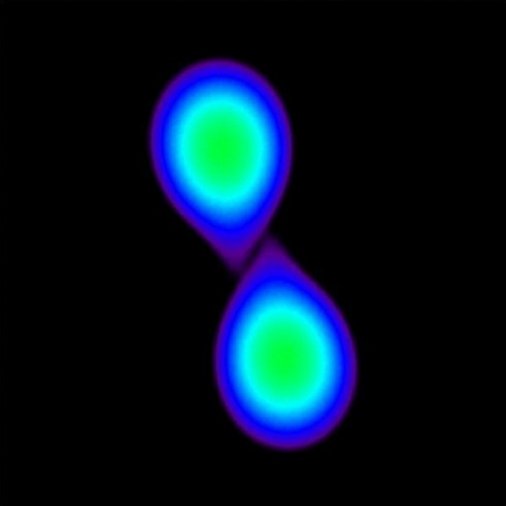First detection of gravitational waves and electromagnetic emission from a neutron star merger

Astrophysicists all over the world are excited by the first detection of gravitational waves and electromagnetic emission from a single cosmic event: the merger of two neutron stars. On August 17, 2017 the super-sensitive laser-antennas of the LIGO/Virgo collaboration detected tiny little ripples in space time that were interpreted as the gravitational-wave signal of a neutron-star merger, dubbed GW170817. Only two seconds later, NASA’s Fermi space telescope observed a bright flash of gamma rays. This triggered a massive search campaign with all kind of ground-based astronomical observatories around the globe. Within a few hours, the source of the signal could be pinpointed to NGC 4993, an elliptical galaxy at a distance of about 130 million light years. In the following days, astronomers all around the world were closely following this unique event with ground and space-based telescopes.
What makes this detection so exciting is its far-reaching impact on various fields of physics and astronomy, ranging from cosmology to nuclear physics. The measurements are in good agreement with theoretical predictions for neutron star mergers. The observations provide for instance very strong support for neutron-star mergers being the origin of short gamma-ray bursts, an idea that has been around for decades. Moreover, the exact shape of the gravitational-wave signal elucidates fundamental properties of matter at highest densities, which can hardly be probed with terrestrial experiments. Finally, the light emitted from this event solves an old mystery about the origin of heavy elements such as gold, platinum and uranium. The origin of these elements was not precisely known before, although neutron star collisions had been discussed as promising candidates. Optical observations of the kilonova associated with GW170817 now show the explosion produced precisely conditions that are needed to forge gold and other heavy elements. In fact, some astronomers believe to have identified traces of these heavy elements in their observation.
At PSO we are also interested in neutron-star mergers. Andreas Bauswein is an expert on the numerical simulation of these dramatic events. Such supercomputer simulations are used to make predictions about the formation of heavy elements and the expected light-curve properties [Goriely et al. 2011]. The calculations also allow to interpret the gravitational-wave signal and infer the behaviour of matter at the highest densities [Bauswein & Janka 2012, Clark et al. 2016, Bauswein et al. 2017]. Markus Kromer works mainly on modelling observable signatures for astronomical transients but is also involved in observational campaigns such as the ePESSTO collaboration. ePESSTO contributed significantly to the optical follow-up observations of GW170817 leading to the identification of heavy elements like Caesium and Tellurium in the kilonova spectra [Smartt et al. 2017].
For further information see the press releases by the LIGO/Virgo consortium http://www.ligo.org/detections/GW170817.php and the European Southern Observatory https://www.eso.org/public/news/eso1733/
About HITS
HITS, the Heidelberg Institute for Theoretical Studies, was established in 2010 by physicist and SAP co-founder Klaus Tschira (1940-2015) and the Klaus Tschira Foundation as a private, non-profit research institute. HITS conducts basic research in the natural, mathematical, and computer sciences. Major research directions include complex simulations across scales, making sense of data, and enabling science via computational research. Application areas range from molecular biology to astrophysics. An essential characteristic of the Institute is interdisciplinarity, implemented in numerous cross-group and cross-disciplinary projects. The base funding of HITS is provided by the Klaus Tschira Foundation.
